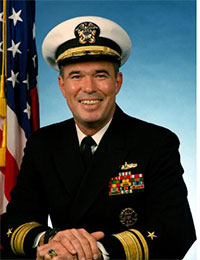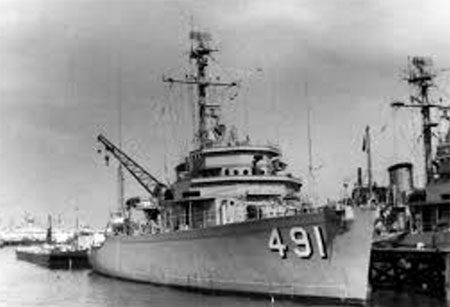TAPS: RADM Ted Sheafer

There is some pretty crazy stuff going on in the world this morning, and I was tempted to break my self-imposed embargo on commenting on some of the most egregious examples of the lunacy. I stayed in last night after a comforting hour-long swim and soaked in what details were available on the bombings at the Istanbul and a t4ext from a journalist pal who was headed there to report on the carnage.
So light an ironic would have been the keynote for the daily drivel this morning, except for the fact that life got in the way in precisely the way that it has a habit of doing.
I do obits for some of the people I know, or knew well as a matter of personal and professional courtesy. The first one I really collaborated on was that of Mac Showers, who was as meticulous about preparing for the next world as he was in the one we shared. Art’s was last week, and I will miss him a great deal, since he was like Denny Harman in being larger than life, and striding through the secret world with bold and sometimes caustic aplomb.
But none of them had the raw human power of Ted Shaefer, and when I got the note about his passing while aimlessly reading mail in bed last night I sat bolt upright.
Ted was a Captain when I first encountered him. Later, I entered his orbit at the Pentagon when he was Joint Staff J2, and the first Gulf War waas puling us in. It was then that I realized how he brimmed with ideas that were much vaster than the OPINTEL world in which I learned the trade of fuzing together the various streams of SIGINT, IMINT, HUMINT and some really spooky programs to be able localize, track and kill Soviet submarines, if required.
It was in the Pentagon, prowling those dim and un-reconstructed WW II-era corridors that I first heard of the Predator drone program, one of Ted’s concepts that literally transformed the nature of both intelligence collection, the means of making war, and conducting an armed foreign policy, all without the risk of having an American pilot shot down and dragged through the streets of some foreign town surrounded by howling mobs.
Vision? Shoot, we had the idea that it would be useful to be able to exchange highly classified material between intelligence commands, and that birthed the revolution that was the Joint Worldwide Communications System, the JWICS system that has become the command-and-control communications system used by everyone in Government from the White House on down.
I remember him telling me something about that one time in the fifth floor Pentagon suite of the Director of Naval Intelligence. They had just outlawed smoking in the building, something that pained me a great deal at the time. Ted had his ashtray in a desk drawer, and he pulled it open, and puffed away as he was telling me what to think. I did not dare pull out my pack of Marlboros. That was just how Ted operated.
He was still doing it when I was working with Bell Labs after the Navy. Constantly innovating, constantly meeting the challenges of a dangerous world. He is one of the men who strode through it all boldly, and changed it himself. The formal account of his life will be along for the papers this weekend, but this is what I wrote to tell his professional colleagues this morning:
Passing of RADM Edward D. “Ted” Sheafer

Former DNI Rick Porterfield passed this sad news last night, from Admiral Sheafer’s daughter, Elizabeth. She said that he passed on Monday, 27 June, in Pennsylvania. His formal obituary will be in the
newspapers this weekend, and we will publish here when they are available.
After graduating from the Naval Academy, Sheafer served as a surface warfare officer for a decade, commanding the minesweeper USS Persistent (MSO-491). Following a tour in Vietnam, Sheafer attended graduate school at Georgetown University, receiving a master of science degree in Foreign Service.
Sheafer’s career included assignments as JCS J2 under Admiral William Crowe and General Colin Powell as well as Deputy Director of DIA during DESERT STORM. Sheafer served as Director of Naval Intelligence from August 1991 to September 1994, commanding a workforce of 2,500 people and a budget of more than $2 billion. Sheafer pioneered a number of efforts which have become ubiquitous far beyond the Intelligence Community, including the Predator UAV and is known as the father of the Joint Worldwide Intelligence Communications System (JWICS) which has become the de facto national SCI messaging, bulk data transfer and teleconferencing capability.
Other OPINTEL positions Sheafer held in his impressive career included:
Fleet Intelligence Officer (N2) for Commander Seventh Fleet (Pacific/Indian Ocean)
Officer-in-Charge (OIC) Fleet Ocean Surveillance Information Center (FOSIC PAC)
OIC Fleet Ocean Surveillance Information Facility (FOSIF WESTPAC Kamisaya, Japan)
Soviet Submarine Analyst, Commander US Naval Forces Europe (CINCUSNAVEUR, London)
Retiring after 35 years active service, he retired from the Navy in 1995 and relocated to Pennsylvania where he acted as an adviser to senior levels in the defense and intelligence communities and continued his pioneering work in advanced wireless communications capabilities, and explosive ordnance disposal (EOD) product development.
No funeral or internment details are available at this time, though we will pass them along as they are made available.
As Rick noted, “Ted was a friend and mentor to many of us, and I am saddened by his passing.”
Please pass along this note to any contacts you have that may have served with RADM Sheafer.
Copyright 2016 Vic Socotra
www.vicsocotra.com
